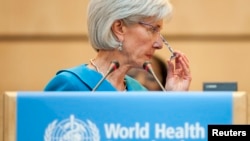In our increasingly interconnected world, it is no longer possible for one country or continent to isolate itself from events and problems occurring elsewhere.
“A growing number of the most difficult health challenges we face are not confined within national borders,” said U.S. Secretary of Health and Human Services Kathleen Sebelius.
Speaking at the World Health Assembly Plenary Session in Geneva, Switzerland, Secretary Sebelius noted that universal coverage is the one goal shared by all participants. And it is a goal that is particularly essential to health and development, dshe said.
“In every nation, those who live in extreme poverty, people with disabilities, and members of traditionally discriminated-against groups have all faced additional barriers to good health and the security of health coverage. Some of those barriers have been put in place by stigma and discrimination. For our goal of universal health coverage to be truly universal, we must work tirelessly to remove those social and institutional barriers—and to find new ways to reach out to those who are most vulnerable to health disparities,” she said. “We need to ensure that all people, even those at the margins of our societies, have the full opportunity to access health coverage.”
The good news is that the global community has made dramatic progress narrowing down the disparity in overall health between wealthy and developing nations. But even as we find resolutions for some of the more stubborn obstacles of the past, new problems appear. Thus, even as we see a gradual decline in infant deaths, we still face complex health challenges, such as the increasing burden of non-communicable diseases like cancer and diabetes, and the H7N9 strain of avian influenza and the novel coronavirus that has appeared in the past year.
“As we look to the future, we will continue to seek out solutions together when it comes to these and other challenges, including building more resilient health systems and addressing the needs of our ageing population,” said Secretary Sebelius.
“Advancing the health of our nations is a fundamental commitment we make to all our people. As President Obama recently reminded us, access to health care is not some earned privilege — it is a right.”
“A growing number of the most difficult health challenges we face are not confined within national borders,” said U.S. Secretary of Health and Human Services Kathleen Sebelius.
Speaking at the World Health Assembly Plenary Session in Geneva, Switzerland, Secretary Sebelius noted that universal coverage is the one goal shared by all participants. And it is a goal that is particularly essential to health and development, dshe said.
“In every nation, those who live in extreme poverty, people with disabilities, and members of traditionally discriminated-against groups have all faced additional barriers to good health and the security of health coverage. Some of those barriers have been put in place by stigma and discrimination. For our goal of universal health coverage to be truly universal, we must work tirelessly to remove those social and institutional barriers—and to find new ways to reach out to those who are most vulnerable to health disparities,” she said. “We need to ensure that all people, even those at the margins of our societies, have the full opportunity to access health coverage.”
The good news is that the global community has made dramatic progress narrowing down the disparity in overall health between wealthy and developing nations. But even as we find resolutions for some of the more stubborn obstacles of the past, new problems appear. Thus, even as we see a gradual decline in infant deaths, we still face complex health challenges, such as the increasing burden of non-communicable diseases like cancer and diabetes, and the H7N9 strain of avian influenza and the novel coronavirus that has appeared in the past year.
“As we look to the future, we will continue to seek out solutions together when it comes to these and other challenges, including building more resilient health systems and addressing the needs of our ageing population,” said Secretary Sebelius.
“Advancing the health of our nations is a fundamental commitment we make to all our people. As President Obama recently reminded us, access to health care is not some earned privilege — it is a right.”

















